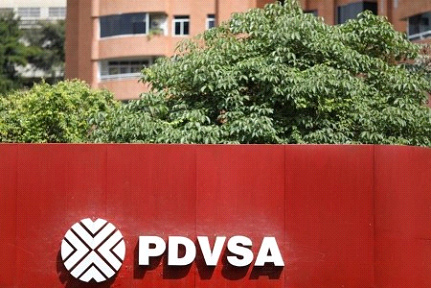HOUSTON/CARACAS (Reuters) – Venezuela’s state-owned oil firm PDVSA is considering a declaration of force majeure if customers do not accept new contract terms to ease a bottleneck of tankers around its two main export ports, according to three sources familiar with the matter.
Venezuela’s export terminals have grown overcrowded since U.S. oil firm ConocoPhillips last month won court orders freezing PDVSA’s key Caribbean operations, where the Venezuelan company used to ship large cargoes to Asian destinations.
Falling production from Venezuela has contributed to a rally in global oil prices to a near four-year high, and other OPEC members may boost output at a meeting later this month to compensate for the shortfall and other risks to global supplies.
Oil is the financial lifeline for the embattled socialist government of President Nicolas Maduro, but his cash-strapped administration has failed to invest enough in the industry to prevent its decline.
PDVSA is notifying all its customers that it will no longer receive new tankers for loading at Jose or Paraguana terminals until it manages to fill the vessels already waiting, one of the sources said.
There were OVER 70 tankers off the coast of Venezuela on Tuesday, according to Thomson Reuters vessel tracking data.
PDVSA plans to divert some tankers to a deep-water operation close to the Paraguana Refining Center (CRP) for ship-to-ship transfers in coming days. The move would allow large vessels to be loaded from tankers temporarily used by PDVSA for storage, the source added.
PDVSA in recent weeks had requested several customers accept this new ship-to-ship methodology for loading, but most refused due to the lack of a third party supervising the operations. Additional costs for completing the transfer also contributed to the refusal, according to shippers and traders.
“We are going to try the ship-to-ship idea first,” the source familiar with the matter said. “Many customers are going to prefer this than continuing to accumulate demurrage,” referred to long waiting times for loading.
One of PDVSA’s Indian customers confirmed it had received a request to load its cargoes via ship-to-ship transfers. The company so far has refused to accept the new terms, said an employee who was not authorized to speak publicly and requested anonymity.
Traders and shippers were skeptical that the transfers would succeed in easing the bottlenecks. PDVSA will still have to load vessels at its Jose port for transporting the crude to its proposed offshore loading facility.
If customers continue rejecting the ship-to-ship proposal, PDVSA could be forced to declare force majeure over shipments going out from Jose and the CRP, the sources said.
PDVSA did not reply to a request for comment.
Conoco last month started seizing PDVSA’s terminals, oil inventories and cargoes in the Caribbean to enforce a $2 billion arbitration award in a dispute over the socialist government’s nationalization of the U.S. oil producer’s Venezuela assets.
PDVSA’s declining crude production, lack of spare parts and materials to run its refineries and difficulty importing oil to blend with its heavy crudes are progressively reducing the amount of crude available for export.
Venezuela’s crude exports declined 28 percent in the first four months of 2018 to 1.19 million bpd compared with 1.65 million bpd in the same period last year, according to Reuters trade flows data.
The OPEC member country has been wracked by political turmoil and a severe recession and hyperinflation.
President Nicolas Maduro ordered the new management of PDVSA to increase crude output by 1 million bpd this year, but production has not turned around. In January-April, crude output fell to 1.62 million bpd, the lowest annual average in over three decades.

